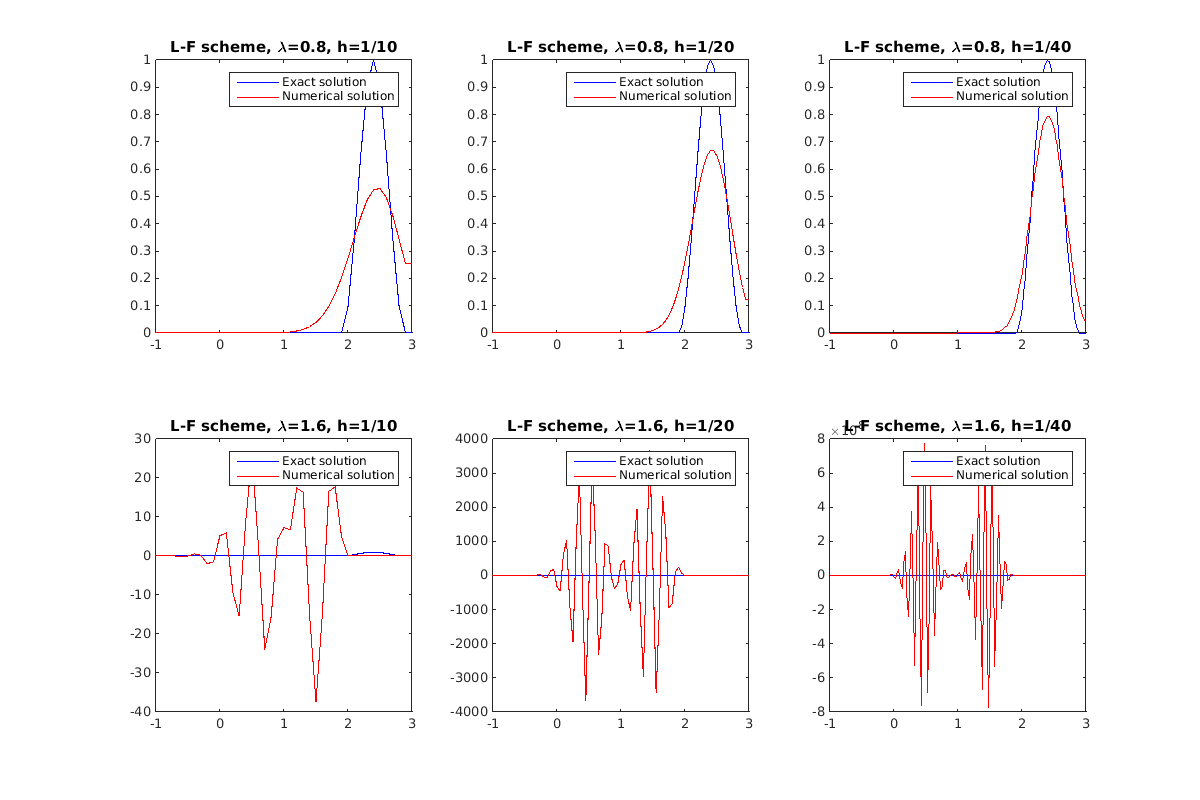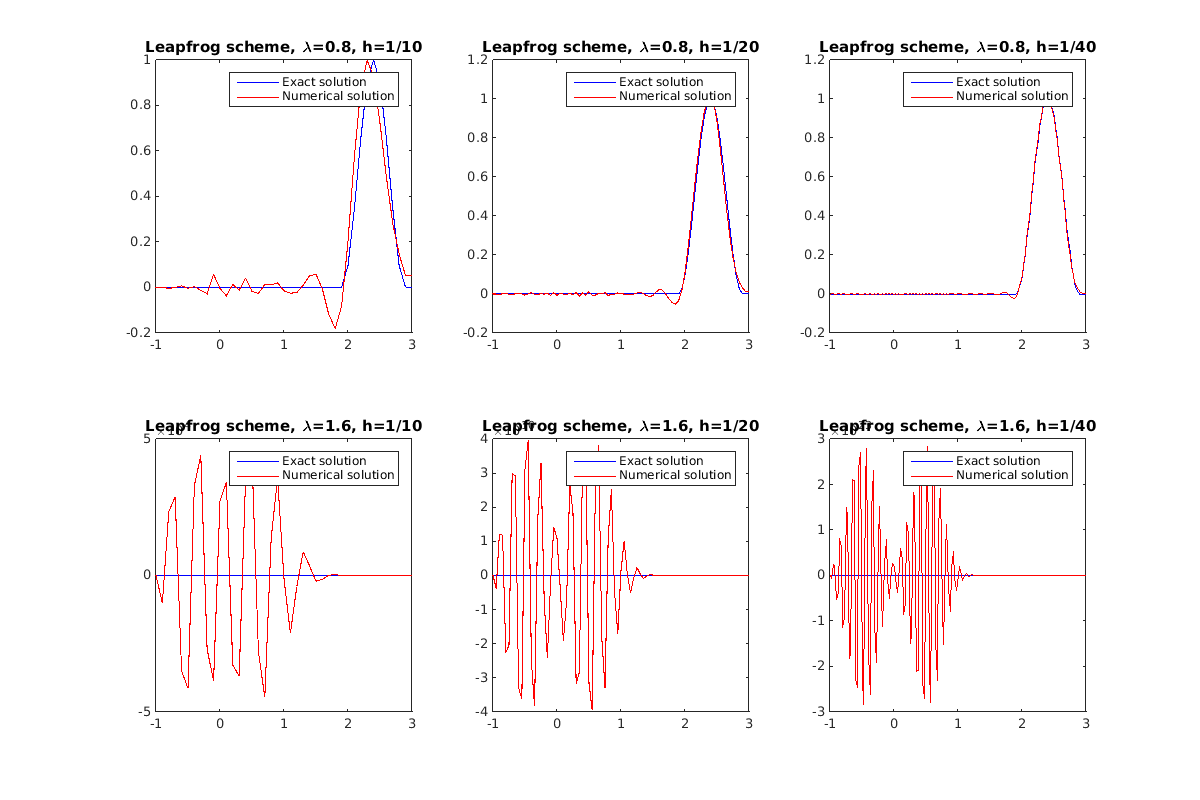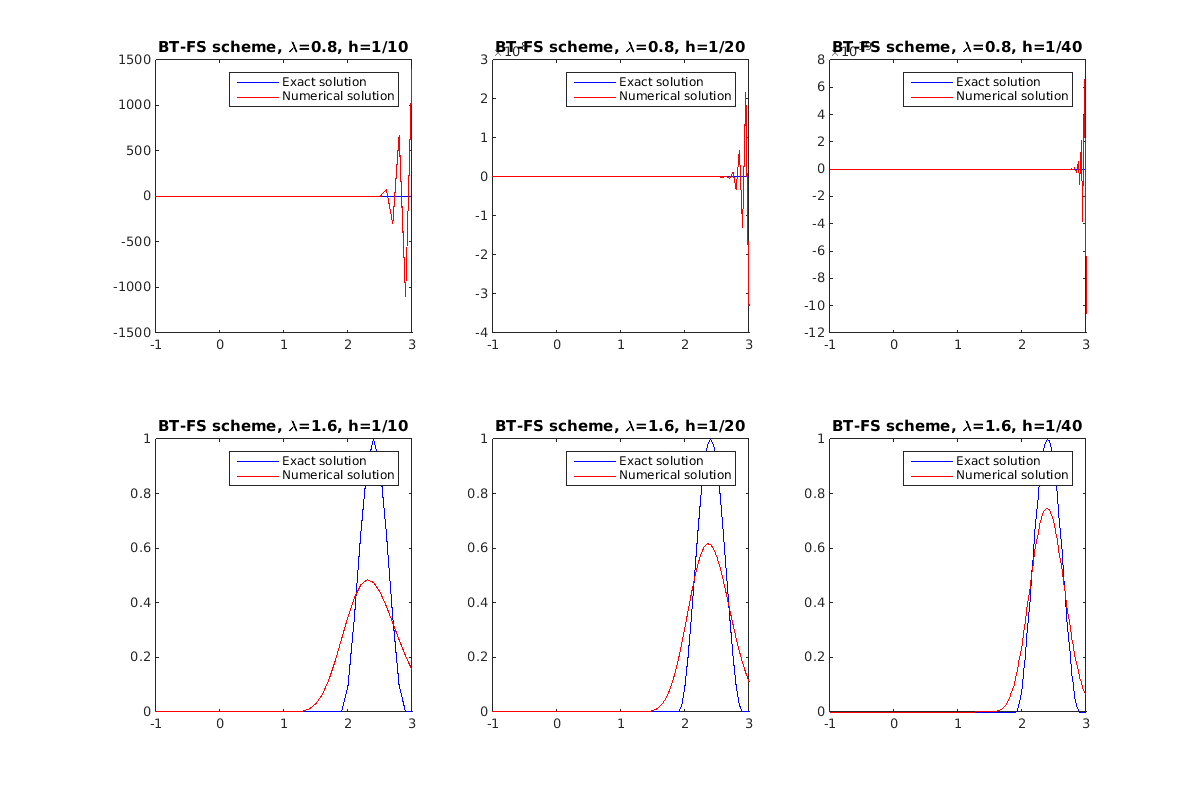function [ ] = hwk1( )
figure('Position', [100,100,1200,800]);
clf;
subplotInd = 1;
for lambda = [0.8, 1.6]
for h = [1/10, 1/20, 1/40]
M = round(4/h);
k = lambda*h;
N = round(2.4/k);
u0 = setInitialCondition(M);
u = LaxFriedrichs (M, N, u0, lambda);
uN = exactSolutionATtN(M);
err = norm(uN - u(N+1,:));
fprintf('Lax-Friedrichs scheme with lambda = %f, h=1/%d, the error ||u^N-U^N||_2 = %f\n', lambda, round(1/h), err);
x = linspace(-1,3,M+1);
subplot(2,3,subplotInd);
subplotInd = subplotInd+1;
plot(x, uN, 'b', x, u(N+1,:), 'r');
legend('Exact solution', 'Numerical solution');
title(['L-F scheme, \lambda=' num2str(lambda) ', h=1/' int2str(round(1/h))]);
end
fprintf('\n');
end
figure('Position', [100,100,1200,800]);
clf;
subplotInd = 1;
for lambda = [0.8, 1.6]
for h = [1/10, 1/20, 1/40]
M = round(4/h);
k = lambda*h;
N = round(2.4/k);
u0 = setInitialCondition(M);
u = LeapFrog (M, N, u0, lambda);
uN = exactSolutionATtN(M);
err = norm(uN - u(N+1,:));
fprintf('Leap frog scheme with lambda = %f, h=1/%d, the error ||u^N-U^N||_2 = %f\n', lambda, round(1/h), err);
x = linspace(-1,3,M+1);
subplot(2,3,subplotInd);
subplotInd = subplotInd+1;
plot(x, uN, 'b', x, u(N+1,:), 'r');
legend('Exact solution', 'Numerical solution');
title(['Leapfrog scheme, \lambda=' num2str(lambda) ', h=1/' int2str(round(1/h))]);
end
fprintf('\n');
end
figure('Position', [100,100,1200,800]);
clf;
subplotInd = 1;
for lambda = [0.8, 1.6]
for h = [1/10, 1/20, 1/40]
M = round(4/h);
k = lambda*h;
N = round(2.4/k);
u0 = setInitialCondition(M);
u = BTFS (M, N, u0, lambda);
uN = exactSolutionATtN(M);
err = norm(uN - u(N+1,:));
fprintf('BT-FS scheme with lambda = %f, h=1/%d, the error ||u^N-U^N||_2 = %f\n', lambda, round(1/h), err);
x = linspace(-1,3,M+1);
subplot(2,3,subplotInd);
subplotInd = subplotInd+1;
plot(x, uN, 'b', x, u(N+1,:), 'r');
legend('Exact solution', 'Numerical solution');
title(['BT-FS scheme, \lambda=' num2str(lambda) ', h=1/' int2str(round(1/h))]);
end
fprintf('\n');
end
end
function [u0] = setInitialCondition(M)
x = linspace(-1,3,M+1);
u0 = zeros(1,M+1);
ind = (x>=-0.5) & (x <= 0.5);
u0(ind) = cos(pi*x(ind)).^2;
end
function [uN] = exactSolutionATtN(M)
x = linspace(-1,3,M+1);
uN = zeros(1,M+1);
ind = (x>=1.9) & (x <= 2.9);
uN(ind) = cos(pi*(x(ind)-2.4)).^2;
end
function [u] = LaxFriedrichs (M, N, u0, lambda)
u = zeros(N+1, M+1);
u(1,:) = u0;
for n=2:(N+1)
u(n, 2:M) = 0.5*(1-lambda)*u(n-1,3:(M+1)) + 0.5*(1+lambda)*u(n-1,1:(M-1));
u(n,1) = 0;
u(n,M+1) = u(n,M);
end
end
function [u] = LeapFrog(M, N, u0, lambda)
u = zeros(N+1, M+1);
u(1,:) = u0;
u(2, 2:M) = u(1,2:M) - 0.5*lambda*u(1,3:(M+1)) + 0.5*lambda*u(1,1:(M-1));
u(2,1) = 0;
u(2,M+1) = u(2,M);
for n=3:(N+1)
u(n, 2:M) = u(n-2,2:M) - lambda*( u(n-1,3:(M+1)) - u(n-1,1:(M-1)) );
u(n,1) = 0;
u(n,M+1) = u(n,M);
end
end
function [u] = BTFS(M, N, u0, lambda)
u = zeros(N+1, M+1);
u(1,:) = u0;
B = diag((1-lambda)*ones(M+1,1)) + diag(lambda*ones(M,1),1);
B(M+1,M+1) = 0;
B(M+1,1) = 1;
for n=2:(N+1)
rhs = [u(n-1,1:M), 0]';
u(n,:) = (B\rhs)';
end
end
Lax-Friedrichs scheme with lambda = 0.800000, h=1/10, the error ||u^N-U^N||_2 = 0.960910
Lax-Friedrichs scheme with lambda = 0.800000, h=1/20, the error ||u^N-U^N||_2 = 0.932571
Lax-Friedrichs scheme with lambda = 0.800000, h=1/40, the error ||u^N-U^N||_2 = 0.828951
Lax-Friedrichs scheme with lambda = 1.600000, h=1/10, the error ||u^N-U^N||_2 = 71.550798
Lax-Friedrichs scheme with lambda = 1.600000, h=1/20, the error ||u^N-U^N||_2 = 10173.330666
Lax-Friedrichs scheme with lambda = 1.600000, h=1/40, the error ||u^N-U^N||_2 = 2539788099.184201
Leap frog scheme with lambda = 0.800000, h=1/10, the error ||u^N-U^N||_2 = 0.520506
Leap frog scheme with lambda = 0.800000, h=1/20, the error ||u^N-U^N||_2 = 0.187264
Leap frog scheme with lambda = 0.800000, h=1/40, the error ||u^N-U^N||_2 = 0.072600
Leap frog scheme with lambda = 1.600000, h=1/10, the error ||u^N-U^N||_2 = 148015.026415
Leap frog scheme with lambda = 1.600000, h=1/20, the error ||u^N-U^N||_2 = 159297647325.648407
Leap frog scheme with lambda = 1.600000, h=1/40, the error ||u^N-U^N||_2 = 1408866869905907016269824.000000
BT-FS scheme with lambda = 0.800000, h=1/10, the error ||u^N-U^N||_2 = 1926.762333
BT-FS scheme with lambda = 0.800000, h=1/20, the error ||u^N-U^N||_2 = 424099960.804756
BT-FS scheme with lambda = 0.800000, h=1/40, the error ||u^N-U^N||_2 = 133364464863178162176.000000
BT-FS scheme with lambda = 1.600000, h=1/10, the error ||u^N-U^N||_2 = 1.032202
BT-FS scheme with lambda = 1.600000, h=1/20, the error ||u^N-U^N||_2 = 1.074747
BT-FS scheme with lambda = 1.600000, h=1/40, the error ||u^N-U^N||_2 = 1.008332





